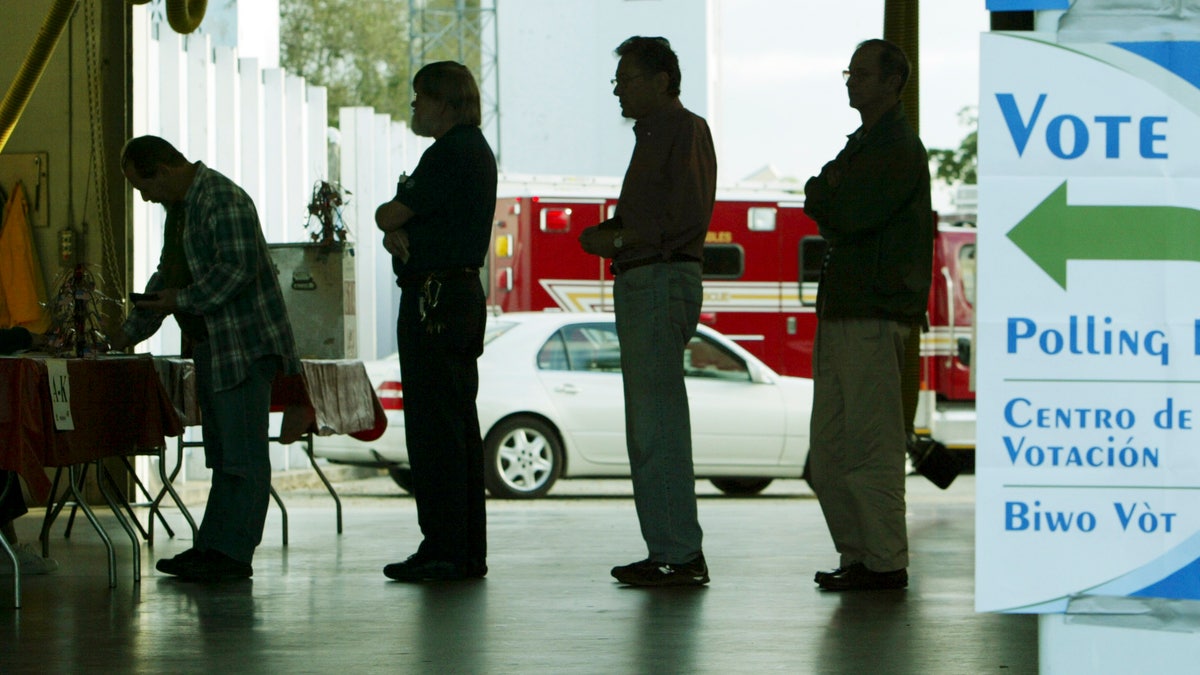
FILE - In this Jan. 29, 2008 file photo, voters line up at a polling station to vote in Florida's presidential primary in Coral Gables, Fla. A Florida commission is expected to announce Friday, Sept. 30, 2011, that its presidential primary will be held Jan. 31, according to Florida House Speaker Dean Cannon, though GOP officials from other states are lobbying Florida to reconsider. (AP Photo/Wilfredo Lee, File) (AP)
Florida decided Friday to hold its Republican presidential primary on Jan. 31, snubbing a party rule against fast-track delegate-selection for 2012 and triggering angry responses from traditional early voting states which will now likely rejigger their calendars to stay ahead.
The move actually thwarts efforts by both major political parties to delay presidential primaries and caucuses. Their aim has been to avoid a repeat of the 2008 scenario, when states jumped ahead of each other at that time in attempts to increase their influence in the process.
In Florida, a special nine-member committee appointed by legislative leaders and Gov. Rick Scott voted 7-2 to set the January date two days after House Speaker Dean Cannon announced that's what it was expected to do.
Cannon and other Florida GOP leaders said they didn't want to jump the traditional early states but wanted to make sure Florida was fifth, even the move was a violation of party rules.
"We're the biggest swing state in the union," said Republican former Gov. Bob Martinez, a member of the selection panel. "Texas is red, New York is blue, California's blue, and we're 10 electoral votes greater than Ohio. ... So I think this is a real, real election in Florida."
Cannon, who is not on the committee, noted that Florida had done the same thing four years ago with a late-January primary that played a key role in selecting Arizona Sen. John McCain as the Republican nominee. All major Democratic candidates, though, boycotted Florida because the early primary violated party rules.
"The sky didn't fall and the moon didn't turn into blood," Cannon said.
Officials in Iowa, New Hampshire, Nevada and South Carolina say they'll probably change their dates to stay ahead of Florida.
They are the only states allowed to go before March 6 under Republican and Democratic party rules.
Iowa GOP Chairman Matt Strawn condemned Florida's action and said his caucus still will remain first, consistent with tradition. He said a date will be set after New Hampshire announces when it will hold its primary.
"The arrogance shown by Florida's elected leadership is disappointing, but not surprising," Strawn said in a statement. "Equally troubling is to see this petulant behavior rewarded with our national convention." The convention will be in Tampa, and Strawn said the penalty should include refusing to credential or seat any member of Florida's primary date selection panel.
In New Hampshire, Secretary of State William Gardner said Friday he can't rule out the possibility that the state will hold its presidential primary in December if necessary to preserve its tradition of holding the nation's earliest primaries. Because of that, he set the filing period for candidates for Oct. 17-28.
"Because we cannot rule out the possibility of conducting the primary before the end of this year, we are, regrettably, as we were four years ago, forced to move the presidential candidates filing period to October," said Gardner, who has sole power to set his state's date. For the 2008 primary, he waited until Nov. 21 to set the Jan. 8 date.
South Carolina Republican Party Chairman Chad Connelly, who has the authority to set the GOP primary date in his state, said Thursday that he wants to schedule it as close to Florida as possible, probably on Jan. 28. That's the Saturday before Florida's primary.
That may push the Iowa GOP caucuses to Jan. 9 followed by the New Hampshire primary on Jan. 17 and the Nevada caucuses on Jan. 21.
The Florida panel stuck with the Jan. 31 date although it no longer was necessary to put the state ahead of Missouri, which has scheduled its primary for Feb. 7.
Missouri Republicans on Thursday decided not to hold a primary. They plan, instead, to select their delegates to the Republican national convention in Tampa during March caucuses.
Florida and other states that hold primaries or caucuses before March 6 stand to lose half of their delegates, but state GOP leaders said it's worth the price to have more influence on the nomination.
With President Barack Obama seeking re-election, Florida Democrats could select their delegates at caucuses after March 6 to avoid being penalized.












































